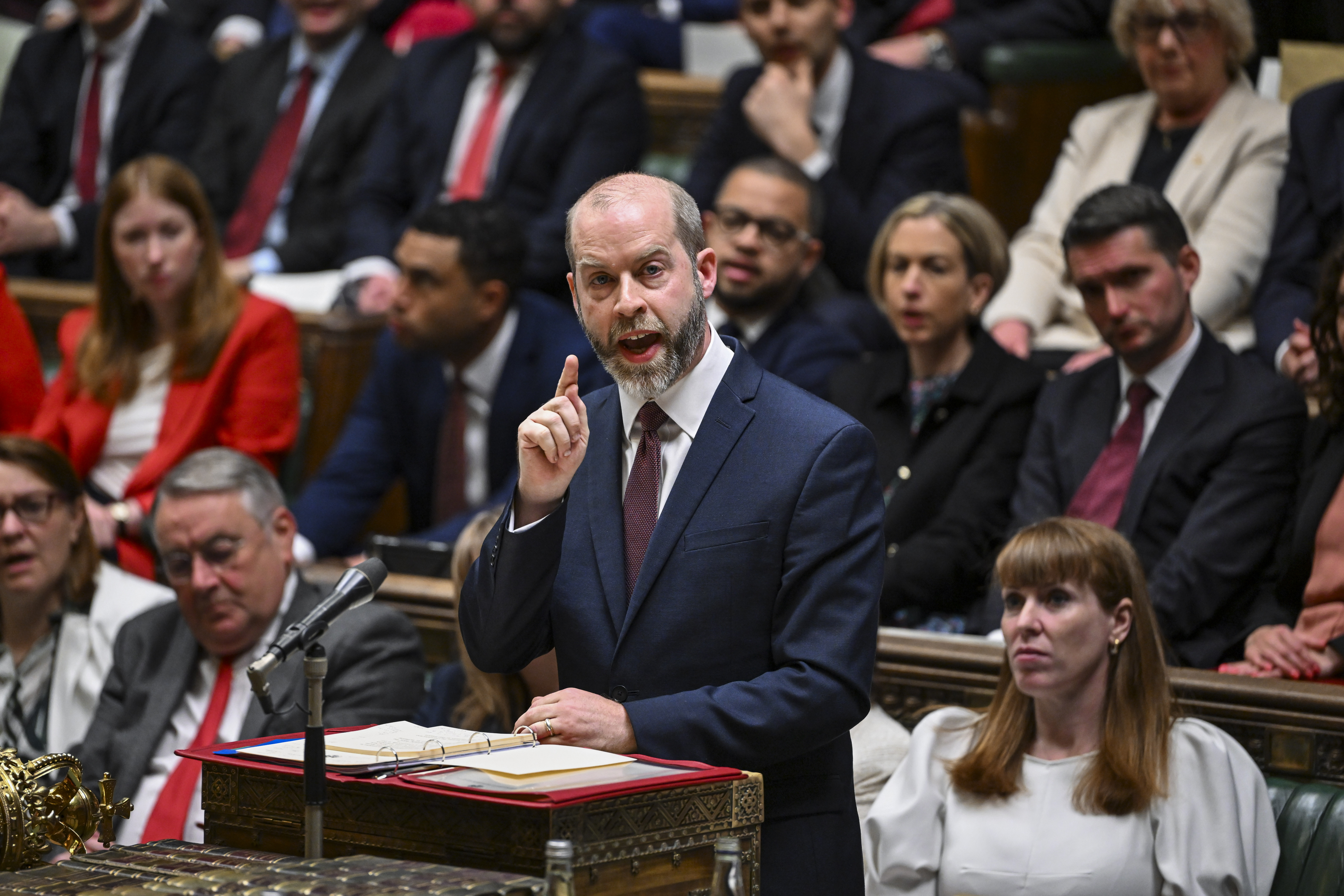In the end, it was David Davis who said it best. Today’s emergency debate on how to save British Steel’s Scunthorpe plant amounted to a ‘nationalisation in all but name Bill’, with new measures amounting to a ‘reprieve, not a rescue’. Jonathan Reynolds, the Business Secretary, did a decent job of affecting reluctance at the sweeping powers being handed to him to order Chinese owners Jingye to buy the raw materials to keep the plant’s two blast furnaces going. ‘I do not want these powers any minute longer than is necessary, but I do need these powers to rectify and save this situation’, he told the House. But, in the key admission of today’s debate, Reynolds told MPs that nationalisation remains ‘the likely option’ in the long term.
That came as no surprise to the 300-odd MPs, hastily assembled for the first Saturday recall of the Commons since the Falklands War. Today’s set up was reminiscent of the Covid debates, with parliament presented with a fait accompli to rubber stump inevitable proposals, overwhelmingly supported by the public. As Daisy Cooper, speaking for the Lib Dems, remarked, the fact that even right-wing MPs were begrudgingly willing to back effective nationalisation ‘shows just how through the looking-glass we really are’. Some were more effusive than others: Richard Tice, speaking for Reform, urged Reynolds to ‘Be courageous, show your cojones, show some mettle, Mr Secretary of State… let’s go for it, let’s nationalise British Steel this weekend and make British Steel great again!’
With little disagreement then on the remedy for the Scunthorpe works, the debate instead centred on the cause of its ailments. Party politics loomed large here. With no vote expected, Alex Burghart instead led on the rushed handling of these measures, insisting that the government had ‘made a total pig’s breakfast… anyone who has been paying any attention to this story over the past few months has known this was coming down the track.’ His colleagues Andrew Griffith and Harriet Baldwin labelled the negotiations as ‘bungled’, claiming that Labour had ‘let the unions dictate their actions’. Sir Keir’s MPs did not take that lying down: Mark Ferguson was among the new boys who boasted that today’s measures showed ‘the difference a Labour government makes’.
For his part, Reynolds was determined to point the blame at both the last government and Jingye. ‘This issue should have been resolved years ago’, he said, rejecting Kemi Badenoch’s claim that, as Business Secretary, she had negotiated a modernisation plan. ‘I wish to make unequivocally clear to the House, the government inherited no such deal’, he said. ‘We could not renege on that deal because it did not exist.’ The Tory leader intervened to respond, insisting that the snap election halted a ‘functioning commercial deal’ ready for Scunthorpe, similar to the one at Port Talbot. Both though agreed on their frustration at Jingye’s handling of the plant, with Reynolds attacking their ‘excessive’ demands for funds and unreasonable rejections of UK government compromises.
Other MPs preferred to point the finger of blame at their favoured villains. Richard Tice blamed ‘net stupid zero’ and ‘short term thinking’ for the bail-out. Sir Iain Duncan Smith attacked Beijing, arguing that ‘too many countries like China, have abused the rules of the free market, have subsided their industries ridiculously and have used slave labour to produce their products. When that happens, the free market is dead’. Union-backed Labour MPs like Lawrence Turner focused on the Scunthorpe steelworkers, asking Reynolds to consider ‘a change in that day-to-day management’, given the breakdown of trust between Jingye and staff.
Unsurprisingly, both Welsh and Scottish MPs queued up too to ask whether Saturday sittings were only reserved for English jobs. ‘Where was this urgency when Welsh steel communities were crying out for support?’ asked David Chadwick, the only Lib Dem Welsh MP. He noted that the Port Talbot had both ‘more capacity and greater output’. Similarly, the SNP’s Stephen Flynn decried Westminster’s handling of the Grangemouth oil refinery. ‘Scotland’s interests matter and the people of Scotland are watching’, he cried to the packed Labour benches opposite.
With much of the debate focusing on the blame for Scunthorpe, far too little attention focused on the detail of the Steel Industry (Special Measures) Bill. It was left to Jeremy Wright, the ex-Tory Solicitor General, to note that in the absence of a committee stage or report stage: ‘It is not enough for this House just to agree we should do something. It is our responsibility to look at the detail of what the government is proposing and decide if it is properly targeted and appropriate for the task.’ He noted that the legislation gives ministers powers to seize assets, enter premises and inflict criminal penalties if the company does not follow their instructions. Compliance with said instructions, Wright noted, is likely to become a hugely contentious point in future.
Such warnings about future pitfalls highlight how today’s debate was merely another chapter in the unhappy story of the UK’s postwar industry. A handful of House of Commons veterans, including David Davis, will remember 1988 when British Steel was privatised, having been successively nationalised, denationalised and then renationalised by Clement Attlee, Winston Churchill and Harold Wilson in the 1940s, 50s and 60s respectively. Perhaps, in a generation’s time, steel will become a matter entirely for private industry and free enterprise once more. But judging by the contributions in today’s debate, those days look a long way off.








Comments